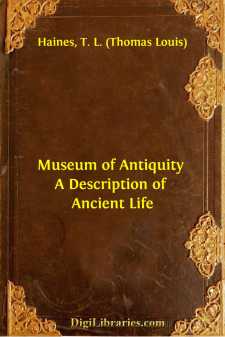Categories
- Antiques & Collectibles 13
- Architecture 36
- Art 48
- Bibles 22
- Biography & Autobiography 813
- Body, Mind & Spirit 142
- Business & Economics 28
- Children's Books 17
- Children's Fiction 14
- Computers 4
- Cooking 94
- Crafts & Hobbies 4
- Drama 346
- Education 46
- Family & Relationships 57
- Fiction 11829
- Games 19
- Gardening 17
- Health & Fitness 34
- History 1377
- House & Home 1
- Humor 147
- Juvenile Fiction 1873
- Juvenile Nonfiction 202
- Language Arts & Disciplines 88
- Law 16
- Literary Collections 686
- Literary Criticism 179
- Mathematics 13
- Medical 41
- Music 40
- Nature 179
- Non-Classifiable 1768
- Performing Arts 7
- Periodicals 1453
- Philosophy 64
- Photography 2
- Poetry 896
- Political Science 203
- Psychology 42
- Reference 154
- Religion 513
- Science 126
- Self-Help 84
- Social Science 81
- Sports & Recreation 34
- Study Aids 3
- Technology & Engineering 59
- Transportation 23
- Travel 463
- True Crime 29
Museum of Antiquity A Description of Ancient Life
Description:
Excerpt
Address to the Mummy.
In Thebes' streets three thousand years ago,
When the Memnonium was in all its glory,
And time had not begun to overthrow
Those temples, palaces and piles stupendous,
Of which the very ruins are tremendous.
"Perhaps that very hand now pinioned flat,
Has hob-a-nobbed with Pharaoh, glass to glass;
Or dropped a half-penny in Homer's hat;
Or doffed thine own to let Queen Dido pass;
Or held, by Solomon's own invitation,
A torch at the great Temple's dedication.
"Thou couldst develop—if that withered tongue
Could tell us what those sightless orbs have seen—
How the world looked when it was fresh and young
And the great deluge still had left it green;
Or was it then so old that history's pages
Contained no record of its early ages?
"Since first thy form was in this box extended
We have, above ground, seen some strange mutations;
The Roman Empire has begun and ended,
New worlds have risen—we have lost old nations;
And countless kings have into dust been humbled,
While not a fragment of thy flesh has crumbled.
"If the tomb's secrets may not be confessed,
[16]The nature of thy private life unfold:
A heart has throbbed beneath that leathern breast,
And tears adown that dusty cheek have rolled;
Have children climbed those knees and kissed that face?
What was thy name and station, age and race?"
A spell that long has bound these lungs of clay,
For since this smoke-dried tongue of mine hath spoken,
Three thousand tedious years have rolled away.
Unswathed at length, I 'stand at ease' before ye.
List, then. O list, while I unfold my story."
* * * * * * * * *
POMPEII.
DESTRUCTION OF POMPEII.
Pompeii was in its full glory at the commencement of the Christian era. It was a city of wealth and refinement, with about 35,000 inhabitants, and beautifully located at the foot of Mount Vesuvius; it possessed all local advantages that the most refined taste could desire. Upon the verge of the sea, at the entrance of a fertile plain, on the bank of a navigable river, it united the conveniences of a commercial town with the security of a military station, and the romantic beauty of a spot celebrated in all ages for its pre-eminent loveliness. Its environs, even to the heights of Vesuvius, were covered with villas, and the coast, all the way to Naples, was so ornamented with gardens and villages, that the shores of the whole gulf appeared as one city.
What an enchanting picture must have presented itself to one approaching Pompeii by sea! He beheld the bright, cheerful Grecian temples spreading out on the slopes before him; the pillared Forum; the rounded marble Theatres. He saw the grand Palaces descending to the very edge of the blue waves by noble flights of steps, surrounded with green pines, laurels and cypresses, from amidst whose dark foliage marble statues of gods gleamed whitely.
The skillful architect, the sculptors, the painters, and the casters of bronze were all employed to make Pompeii an asylum of arts; all trades and callings endeavored to grace and beautify the city....


